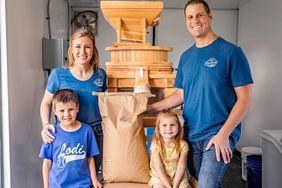:max_bytes(150000):strip_icc()/GettyImages-dv1636041-5a04a2404e4f7d0036421527.jpg)
Getty Images
Few people have scrutinized more relay races than Mike Jay. The announcer started behind the mic at rural Iowa track and field meets in the mid-1980s while coaching at his alma mater, Columbus Community High School. Today, he travels the world calling out athletes’ accomplishments from the National Collegiate Athletic Association championships, Olympic trials, and Millrose Games.
Like the thousands of athletes Jay has seen pass the baton around the track, farmers in agricultural organizations are running a relay, but theirs may be decades-long. To keep an organization moving forward, leaders should consider these principles from veterans of track and field.
Know the big goal
“A good relay team needs to know what their goal is,” Jay explains. “Is their goal only to finish? To set a new record? Is their goal to win the race?”
Organizations or family farms need a shared purpose, too. A mission statement is a great way to unify the team working toward the same goal.
Develop a relay mentality
In the 4×100 race, four athletes each run 100 meters. The distance is the same every time, and the runners prepare themselves to expend all their energy in that span.
Iowa farmer Wayne Humphreys believes the same idea should be true for board elections. “You ought to know when you get on a board that you have this amount of time, and that there’s an end point.” Term limits can be empowering, he says. “You can give it hell for your 100 meters knowing there’s somebody there to receive that.”
For example, in Iowa Corn Growers Association leadership, the person elected vice president assumes the top role the next year. “By succession, you know you’re going to be president. The next year, you’re going to be past president,” Humphreys says. The vice president’s job is to find people to run for that position when the individual moves into the presidency.
Predictable terms also help people time their leadership service with personal milestones. Perhaps they want to serve an organization before they have children or after their kids are grown. Maybe they don’t want to get married or start a new business the same year they are president or chair.
Boards with a tradition of lifetime appointments can be scary and unattractive to bright, ambitious young people.
Don't be a cocky athlete
That’s not to say individual runners can’t aim to set a personal record or pass a competitor during their leg of the race. Leaders should have personal goals for their term, too, but without sacrificing the mission the team has set.
Leaders who put their priorities, or glory, ahead of their team are just as distracting as a cocky athlete on the field.
From the press box, Jay sees “a lot of prima donnas out there that think they don’t need to practice handoffs because they’re so good. It blows up in their face every time. None of us are too good to practice,” he says.
The same can happen in organizations where work is never delegated, committees aren’t utilized, and the baton is never passed. When one person holds a leadership position for decades, other individuals don’t have the opportunity to use their talents, and progress of the organization can stagnate, University of Kentucky Extension professor Steve Isaacs, 70, explains.
“Leaders do their best work in the first five years or so,” Isaacs says. After that, just like a tiring athlete, many run out of enthusiasm or effectiveness.
Illinois farmer and real estate professional Jon Griffel recognizes this. Recently, the 30-year-old revived the Carlinville CommUnity Chamber of Commerce, prompting it to grow from 12 members to 80. At some point, the group will begin a new chapter with focus on engaging and retaining the large membership, he says, and he expects to pass along the presidency.
Good leaders don’t have to be chair or president of every organization they’re in, Carie Marshall-Moore, 46, recently reminded attendees at the 2023 Annie’s Project Conference held in St. Louis to educate and empower women in agriculture.
Find the right leaders
Each athlete in a 4×100 relay is selected with intention. The first runner should be the best starter out of the blocks. The second athlete must be able to receive and hand off the baton left-handed. The third runner should excel running on a curve, and the final runner needs to stay poised through a competitive finish.
Slotting the right leader for the right time isn’t unique to track. “If we know we’re going to have a particularly difficult legislative environment, we find somebody who is not repulsed by politicians,” Humphreys says. “If corn exports are down, we may find somebody who has experience with the grains council.”
Humphreys, 74, says, after nearly a decade serving Iowa Corn and the U.S. Grains Council, he has intentionally stepped back from his commodity board roles.
“Most 70-year-old farmers have rented their farm out, whether it’s to family or somebody else,” he says. “It has been years since you’ve been at the seed corn dealer. Your private pesticide applicator license expired, and the last time you made a parts run you saw the bill and thought there must be a mistake. These are signs you are now a spectator.
“This other guy, his wife is working, he’s got two kids, they’re paying hundreds of dollars a week for day care. His world is completely different. He rents all his ground. Doesn’t own a thing except for a pickup and a couple of tractors. That’s the future of agriculture there,” explains Humphreys.
He believes it’s more appropriate for the younger producers who will live with the consequences of a board’s position on topics such as carbon pipelines and right to repair to have seats at the table.
Organizations need various styles of leaders, too. 4-H Clover Kids need a different style of leadership than adults serving on a Farm Bureau board, Marshall-Moore says.
Practice handoffs
During practice, track athletes determine the space they need to pass the baton. “They say, ‘OK, we can make this handoff successfully if I take off when you’re 13 steps away from me,’” Jay explains. They measure that distance and mark it with a piece of tape. When the runner with the baton hits that piece of tape, the next runner takes off.
He says a lot of bad handoffs happen when athletes don’t practice their steps. Jay recalls his own days as an athlete. “Our teams practiced handoffs every single night. Not just the day before the meet,” he says.
Similarly, agricultural transitions that are successful have been an open conversation for years, says Vance Crowe, 42, founder of Legacy Interviews. Crowe’s business records interviews with individuals and couples so that their experiences and wisdom can be shared with future generations.
Talk of transition and encouraging incoming leaders should be a regular topic around the dinner table and on the monthly meeting agenda. Goals for developing new leaders ought to be part of your organization’s strategic plan, says Isaacs.
The small handoffs of delegating tasks, leading a meeting, or managing a project are just as important as the gavel-passing ceremony when a new leader is installed.
Regroup and learn
One thing is sure to keep you from reaching your personal and team goals: quitting. Jay has seen plenty of athletes who weren’t smoothly handed the baton get mad and stop. On the track, or in the boardroom, when you’re on the receiving end of a rough handoff, Jay says you have a decision to make. “Do we just stop and throw in the towel and go off and pout? Or do we make the most of a bad situation and try to do as well as we can?
“Regroup on the fly and do the best you can to make it better,” Jay advises. Then, take the time to learn from mistakes that were made. It isn’t about pointing fingers. The appropriate team member needs to own the mistake, and then the team can grow from it.
Marshall-Moore says you should expect mistakes when working with other people, “whether you are coming in or going out. Just like you want to be allowed grace, give grace to others.”
Be a cheerleader
Athletic teams of all levels acknowledge the supportive fans and teammates who contribute to their success. Here are ideas for being positive and encouraging.
Seek the teammate on the sidelines. Effective leaders are also cheerleaders. Humphreys prefers to seek out the quiet people in the room during break or lunch to ask their thoughts. He’s known to send a short text of congratulations or encouragement to those in his network who’ve had recent accomplishments or recognition.
Invest in the next generation. Humphreys says he’s seen the power of an organization investing in new leaders. For example, Iowa Corn Growers Association offers an elite I-LEAD class (Iowa Corn Leadership Enhancement and Development) for a small group of selected farmers and agriculture professionals. A lot of resources are dedicated to the group. Members travel domestically and internationally and receive training with the message, “We think you have potential. And we’d like to be part of that potential,” Humphreys says.
Be the hands and feet. Marshall-Moore has an extensive resume with board roles at the local to national level. However, “just because we can do the thing, doesn’t mean we have to do the thing,” she stresses. After handing off the baton in some groups, she’s finidng new joy attending events where her only commitment is “bringing a pan of bars and folding up chairs.”
Passing the baton checklist
Consider access to digital assets, possession of physical items, and tasks that may need completing as part of the leadership handoff. Here's a list to get you thinking.
Documents
- Past minutes
- Templates for important documents
- Articles of incorporation
- Policy and procedure manual
- Bylaws
- Committee information
- Banking records
- Past tax returns
- Style guide with logo files, fonts, brand colors
- Inventory of tools, tables, and other physical assets
Accounts
- New email address
- Bank account access
- Social media passwords/admin rights
- Website management access
Contacts
- Vendors
- Attorney
- Banker
- Accountant/bookkeeper
- Membership rolls
Items
- Name tags
- Apparel
- Gavel
N.R. Narayana Murthy, Infosys co-founder
“When you run a part of the relay and pass the baton, there is no sense of unfinished business in your mind. There is just a sense of having done your part to the best of your ability. That is it. The hope is to pass the baton to somebody who will run faster and run a better marathon.”
Editor's note: This article is a follow-up to February 2022's cover story, "Your Time Will Come..."
:max_bytes(150000):strip_icc()/NatalinaBausch-6-06b14ffcaa32491e802c91c09e7fc867.jpg)













